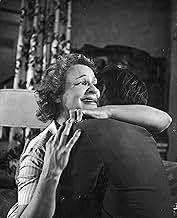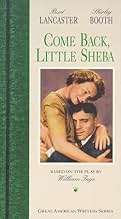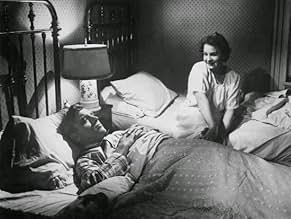NOTE IMDb
7,5/10
5,7 k
MA NOTE
Le docteur Delaney et sa femme, Lola s'occupent énormément de Marie, leur jeune locataire. Le docteur s'inquiète de voir Tuck courtiser Marie, puisque celle-ci est déjà fiancée...Le docteur Delaney et sa femme, Lola s'occupent énormément de Marie, leur jeune locataire. Le docteur s'inquiète de voir Tuck courtiser Marie, puisque celle-ci est déjà fiancée...Le docteur Delaney et sa femme, Lola s'occupent énormément de Marie, leur jeune locataire. Le docteur s'inquiète de voir Tuck courtiser Marie, puisque celle-ci est déjà fiancée...
- Réalisation
- Scénario
- Casting principal
- Récompensé par 1 Oscar
- 7 victoires et 8 nominations au total
Robert Fuller
- Extra
- (non crédité)
Ned Glass
- Man at AA Meeting
- (non crédité)
William Haade
- Hospital Intern
- (non crédité)
Virginia Hall
- Blonde in Diner
- (non crédité)
Anthony Jochim
- Mr. Cruthers
- (non crédité)
Peter Leeds
- Milkman
- (non crédité)
Kitty McHugh
- Pearl Stinson - AA Member
- (non crédité)
Paul McVey
- Postman
- (non crédité)
Beverly Mook
- Judy Coffman
- (non crédité)
Virginia Mullen
- Henrietta Colby - AA Member
- (non crédité)
Avis à la une
An acting triumph for both Shirley Booth and Burt Lancaster. This film will stay with you for a long time. Booth won a well deserved Oscar for this performance and it is well worth the time to view it. This is not a happy film obviously to look at but if you appreciate great acting as much as I do, you will really enjoy Come Back Little Sheba.
Days of Wine and Roses and The Lost Weekend deal with the problem of those afflicted with Alcoholism. Both are fine films. This movie is better than those two and that's only part of the story in this picture. Shirley Booth gives a most certainly well deserved Academy Award winning performance as the wife of a recovering alcoholic husband. Burt Lancaster in a role he is not often remembered for is the husband. A once proud and respected person who falls by the wayside due to his drinking has picked himself up and is determined to start over again even though various demons still linger inside him. I first saw this motion picture on New Years eve back in the late 60's on NBC's Saturday Night at the Movies. During the week preceding the showing NBC advertised it with the clip of Lancaster going after Booth with a kitchen knife. My older sibling and I not really old enough to know about such things joked about the scene. When we watched the movie and it came to that part we were no longer joking. I didn't see it for many years until it aired on AMC. The film is as powerful today in its story and it's acting performances as when I first saw it and I'm certain when it was first released in 52. A must see.
This film is as powerful as when I first saw it as a teenager. One would think that after 50 years, the material would seem dated. But in fact, a lot of what was said then, seems even more relevant today. Inge is unfortunately a very underrated writer. He seemed to respond to things on a much more emotional level than many of his contemporaries and this is why his material has not lost interest. His plays never seem to go to an intellectual level. He wrote about what he knew and didn't try to be something he wasn't. Are there really Blanche DuBois and Willie Lomans today? Just listening to those plays, as wonderful as they might be, is something we can no longer relate to. But there will always be Lola Delaneys. Everyone knows a few of them. The film was obviously made on a very tight budget and we are lucky for that. Imagine how it would have been had they cast Rosiland Russell and Jimmy Stewart. Though Burt Lancaster was miscast, the simple fact that he was a great actor, means his performance comes off amazingly well. And what more can be said about Booth, except the extreme regret we who never saw her in the play onstage must feel. The power of that performance is beyond description. Anyone who likes this movie should try to get hold of the new recording of the musical version. It was obviously written by people with tremendous love and respect for Inge's work.
William Inge's play transfers nicely to the big screen, with perfectly cast leads Shirley Booth and Burt Lancaster.
A middle aged, childless couple struggles with the husband's periodic alcoholic "episodes". When they rent out a room in their house to a young college girl, the audience learns a lot about the couple just by observing their reactions to "the young people". "Doc" Delaney exhibits fatherly, protective feelings toward the young woman, expressing disgust when she brings a young man to her room. A regular at AA meetings, he eventually "gets sick" again. Determined never to give up, his devoted wife Lola stands by her man. The ending leaves us hopeful that all will turn out well.
There are many beautiful moments in this film, assuring a lover of tearjerkers a full pay-off! Shirley Booth deserved her 1953 Oscar for her portrayal of Lola Delaney. Oh, and don't look for little Sheba, she won't be back.
A middle aged, childless couple struggles with the husband's periodic alcoholic "episodes". When they rent out a room in their house to a young college girl, the audience learns a lot about the couple just by observing their reactions to "the young people". "Doc" Delaney exhibits fatherly, protective feelings toward the young woman, expressing disgust when she brings a young man to her room. A regular at AA meetings, he eventually "gets sick" again. Determined never to give up, his devoted wife Lola stands by her man. The ending leaves us hopeful that all will turn out well.
There are many beautiful moments in this film, assuring a lover of tearjerkers a full pay-off! Shirley Booth deserved her 1953 Oscar for her portrayal of Lola Delaney. Oh, and don't look for little Sheba, she won't be back.
Shirley Booth was a remarkably versatile actress - she did comedies, musicals, and dramas - and won the adoration of critics and audiences in all. But as with Agnes Moorehead and Eve Arden, her success in a TV comedy, "Hazel" tended to over-shadow her work on stage or film. A well-liked comedic actress on Broadway since the 1930s, she reinvented herself as a dramatic actress in 1949 with COME BACK, LITTLE SHEBA, winning every award in sight. Although the film version was offered to the likes of Bette Davis (who turned it down because she felt she couldn't bring to the role the "gorgeous vagueness" Booth had), Hal Wallis wisely went with Booth to recreate her stage role, casting Burt Lancaster for box-office appeal.
Booth's performance as Lola is astonishing, filled with nervous energy and anxiety, living on the edge - ask anyone who's ever lived with an alcoholic - every gesture, every emotion she plays, is honest and accurate. When I finally saw this film in the early 1990s, I was floored by Booth - where in heck had she done her research? Help for families of alcoholics (the Al-Anon Family Groups) was still several years off when the stage version was done - the resources available to Booth would have been "open" AA meetings and perhaps talking with family members. (Incidentally, the director, Daniel Mann, wasn't finished with AA - a more realistic AA meeting figured in his 1956 I'LL CRY TOMORROW, in which he directed Susan Hayward to an Oscar nomination - ironically, she lost out to Anna Magnani's Mann-directed performance in THE ROSE TATTOO!)
Booth was still alive at the time I first saw this film (around 1991-92), and I knew after watching that, unfortunately, her great success as TV's "Hazel" over-shadowed SHEBA, and that when she died, the obit's would begin, "Shirley Booth, TV's HAZEL, is Dead..." and I was right. Agnes Moorehead had a similar fate - the generation which grew up on "Bewitched" was clueless that Moorehead was one of the finest, most versatile and respected actresses around and, like Booth, every bit the equal of the other leading ladies (whom she'd usually supported). I remember attending a screening for the 50th anniversary of CITIZEN KANE and hearing gasps of astonishment as the cast's names appeared "That was AGNES MOOREHEAD!!!!"
Yes, indeed. And THAT was Shirley Booth, breaking our hearts in COME BACK, LITTLE SHEBA. Forget "Hazel," and bring tissues.
Booth's performance as Lola is astonishing, filled with nervous energy and anxiety, living on the edge - ask anyone who's ever lived with an alcoholic - every gesture, every emotion she plays, is honest and accurate. When I finally saw this film in the early 1990s, I was floored by Booth - where in heck had she done her research? Help for families of alcoholics (the Al-Anon Family Groups) was still several years off when the stage version was done - the resources available to Booth would have been "open" AA meetings and perhaps talking with family members. (Incidentally, the director, Daniel Mann, wasn't finished with AA - a more realistic AA meeting figured in his 1956 I'LL CRY TOMORROW, in which he directed Susan Hayward to an Oscar nomination - ironically, she lost out to Anna Magnani's Mann-directed performance in THE ROSE TATTOO!)
Booth was still alive at the time I first saw this film (around 1991-92), and I knew after watching that, unfortunately, her great success as TV's "Hazel" over-shadowed SHEBA, and that when she died, the obit's would begin, "Shirley Booth, TV's HAZEL, is Dead..." and I was right. Agnes Moorehead had a similar fate - the generation which grew up on "Bewitched" was clueless that Moorehead was one of the finest, most versatile and respected actresses around and, like Booth, every bit the equal of the other leading ladies (whom she'd usually supported). I remember attending a screening for the 50th anniversary of CITIZEN KANE and hearing gasps of astonishment as the cast's names appeared "That was AGNES MOOREHEAD!!!!"
Yes, indeed. And THAT was Shirley Booth, breaking our hearts in COME BACK, LITTLE SHEBA. Forget "Hazel," and bring tissues.
Le saviez-vous
- AnecdotesShirley Booth's movie debut.
- GaffesWhen Doc takes the bottle from the kitchen cabinet, inexplicably there is no knob on the left hand door. When Lola opens the cabinet to check on the bottle, the knob is there and she uses it to open the same door.
- Citations
Doc Delaney: Alcoholics are mostly disappointed men.
Lola Delaney: Sure, I know.
[pause]
Lola Delaney: You was never disappointed, were you, Doc?
- ConnexionsFeatured in Film Review: Burt Lancaster (1968)
Meilleurs choix
Connectez-vous pour évaluer et suivre la liste de favoris afin de recevoir des recommandations personnalisées
- How long is Come Back, Little Sheba?Alimenté par Alexa
Détails
- Date de sortie
- Pays d’origine
- Langue
- Aussi connu sous le nom de
- Come Back, Little Sheba
- Lieux de tournage
- Société de production
- Voir plus de crédits d'entreprise sur IMDbPro
- Durée
- 1h 39min(99 min)
- Couleur
- Rapport de forme
- 1.37 : 1
Contribuer à cette page
Suggérer une modification ou ajouter du contenu manquant

























